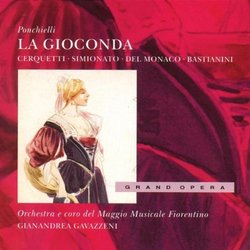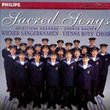| All Artists: Gianandrea Gavazzeni, Anita Cerquetti, Giulietta Simionato, Mario del Monaco, Cesare Siepi, Ettore Bastianini, Franca Sacchi, Anthos Cesarini, Giorgio Giorgetti, Orchestre e coro del Maggio Musicale Fiorentino Title: Ponchielli: La Gioconda Members Wishing: 0 Total Copies: 0 Label: Polygram Records Release Date: 10/12/1993 Genre: Classical Style: Opera & Classical Vocal Number of Discs: 2 SwapaCD Credits: 2 UPCs: 028943377027, 028943377027 |
Search - Gianandrea Gavazzeni, Anita Cerquetti, Giulietta Simionato :: Ponchielli: La Gioconda
 | Gianandrea Gavazzeni, Anita Cerquetti, Giulietta Simionato Ponchielli: La Gioconda Genre: Classical |
Larger Image |
CD DetailsSimilar CDs
|
CD ReviewsGreat recording of a neglected opera V. Chau | San Diego, CA | 12/19/2003 (5 out of 5 stars) "This recording is great! Ponchielli's opera has been unfairly maligned over the years. It contains great, effectively-orchestrated music and six wonderful roles for the leading singers. Sure, the plot is very melodramatic and the ending (Barnaba running away through an alley) is ridiculous, but it's the music that counts. The title role, Gioconda, is a difficult one to sing. It demands many low notes and a fair share of high notes. Anita Cerquetti has a huge, dark voice that is just right for Gioconda. The only problem I have with her voice is that her vibrato sometimes becomes excessive, especially in high-lying passages. She is very convincing as the street singer. Her concern for her blind mother, La Cieca, is believable and the way she conveys Gioconda's different emotions is great. Her low notes are strong and most of her high notes are very good. In the Act Four Gioconda/Enzo/Laura trio, her last high note becomes a screech. Her Italian diction is very fine and her phrasing is exemplary. The power and fury she unleashes in her confrontation with Enzo in Act Four is exhilarating. This confrontation is a highlight of the recording. Enzo is sung by Mario del Monaco. When he makes his entrance trumpeting out "Assassini", your ears are pinned back. He is a great Enzo. He not only sings loudly, but also softly. His golden tenor is thrilling in its power and he gives a glorious account of "Cielo e mar". When he and Cerquetti confront each other in Act Four, the sparks really fly. Laura is sung by Giulietta Simionato. This mezzo-soprano is known for her great acting, both physical and vocal, and here, she does not disappoint. Her voice is a bit heavy for Laura, but she sings her music very well. Her duet with Cerquetti is thrilling in its intensity. Cerquetti's voice blazes with unbridled fury. Simionato holds her own, asserting her love for Enzo. The first note she sings in the phrase "L'amo come il fulgor" is both thrilling and beautiful. Her "Stella del marinar" is fine, but the last high note could have been better captured by the recording engineers. Ettore Bastianini sings Barnaba with evil, insinuating tones. He is truly scary as Alvise's spy. His voice is positively huge on this recording and he is by far the most consistently loud of the six leading singers. His aria "O monumento" is filled with hate and evil. It is gloriously sung and ends on a huge high note. His fisherman's song in Act Two is sung wonderfully. Cesare Siepi is an effective Alvise. He doesn't have much to sing, but what he does sing is great. Franca Sacchi is a good La Cieca. She has strong high notes and effectively portrays her character's piety. Ponchielli wrote some wonderful music for this opera. He packed this work with numerous ensembles, some of which are very loud. His writing for the orchestra is great. He wrote a wonderful ballet, "The Dance of the Seven Hours", and his writing for the party scene in Scene Two of Act Three is scintillating. The boys' chorus at the beginning of Act Two is charming. The music depicting Laura's escape from Barnaba, played by the orchestra's string section and lasting several seconds, is very effective in evoking the flight of vessels through Venice's canals. The Gioconda/Enzo/Laura trio in Act Four is both moving and melodious.This recording is well conducted by Gianandrea Gavazzeni. He paces the music just right. The playing of the orchestra is wonderful. Decca supplies multi-lingual synopses and an Italian libretto with English translation. The sound is very good.Highly recommended." A Gioconda to cherish! harrmor | Athens, Greece | 01/17/2003 (5 out of 5 stars) "Gioconda is an underestimated opera. Many consider it not quite beautiful, without beautiful melodies. It may be true but when you have finished listening to it, you will not be sorry at all. Some other operas may have a more firm place in your heart and mind, but this one will not disappoint you. This recording is considered one of the best. In the title-role we have Anita Cerquetti, a soprano who was chosen by Decca to become their new star (after the truly great Renata Tebaldi) but didn't quite come off,she retired very early and she didn't record much (I think this is her only complete opera studio recording). She is magnificent. Her voice may sound a little peculiar to the ear but she gives thrilling top notes, her technique is faultless and she presents us a very credible Gioconda. A great bravo! Then we have Mario del Monaco in one of his best recordings. He portrays the heroic Enzo and his voice is perfect for the role. He also sings quietly (something he didn't do often) and follows the voice markings of the score.Very good indeed. As the sinister Barnaba we have one of the best baritones ever, Ettore Bastianini. He gets inside the role and gives us the best portrayal on record of this "villain", both vocally and dramatically. Giullietta Simionato sings the role of Laura, Enzo's beloved. Her voice is in perfect form, her technique also and gives us one of the best "Stella del marinar". Finally, we have Cesare Siepi as Alvise. His strong bass voice is the perfect instrument for the role and his portrayal is appropriately dark and sinister. The minor roles are quite adequately cast and Gavazzeni conducts with warmth and tenderness and lets his singers sing and act with ease. All in all, an excellent recording of this underrecorded work! If you like Ponchielli, don't miss it!" A great cast singing in the Grand Tradition Ralph Moore | Bishop's Stortford, UK | 10/14/2008 (5 out of 5 stars) "Cerquetti recorded very little - only a recital record and this one - so this is a valuable memento of a great singer. But not only that; she is supported by a dream cast - especially by today's standards, where voices of this amplitude and splendour are rare.
I note that the previous 2001 review on Amazon.co.uk., which absurdly gives this recording a mere three stars, was reproduced here on Amazon.com in 2003 but this time with four stars, as if the author had wisely reconsidered - but this set must merit five stars, given the quality of the interpretations, conducting and sound. I do not say that this is the best "Gioconda" of all; I would still favour Tebaldi's (see my review) or Callas' later version as my overall recommendation - but I would not wish to be without this riveting account. Virtually anything Gavazzeni directed was worth hearing and this is certainly no exception. I am frequently amused by the number reviews you can encounter whereby people seem to surprised to report than Del Monaco sings quietly and subtly. This is the result of (mainly British) critcs moaning about Del Monaco's "incessant bawling", as they phrase it. In fact, despite his clarion tones, he often attempted to refine his huge sound often and frequently succeeded. If anything, Bastianini was more guilty of singing excessively loudly - but with a voice like that, who cares? None of the singers here is exactly small voiced - thank goodness; this is Italian singing of the kind to raise the rafters. Everyone is a major star, yet this recording captures a not-so-unusual night at the opera house in mid-fifties Italy. A special mention, too, for the boys in the Fiorentino choir; they sing with a real zest and abandon which is both moving and exhilarating. Perhaps it is finally possible to mention "Gioconda" without making any apologies for it. It is jam-packed with wonderful tunes and hair-raising dramatic confrontations; I consider the magnificent spat between Gioconda and Laura on board ship, which concludes Act 2, to be one of the great duets in opera. It brought out the best in Callas, who said that if we wanted to know what she was all about we needed only to listen to the last act of her second "Gioconda" recording - but Cerquetti need fear no invidious comparisons with her celebrated contemporary; her huge, dark, spinto soprano is fully up to the demands of the role, even if she cannot provide Callas' verbal insights and range of colour. A perspective of fifty years permits us to give this recording its proper due, whereas when it appeared it was either rather taken for granted or even dismissed as second rate. Not any more." |



